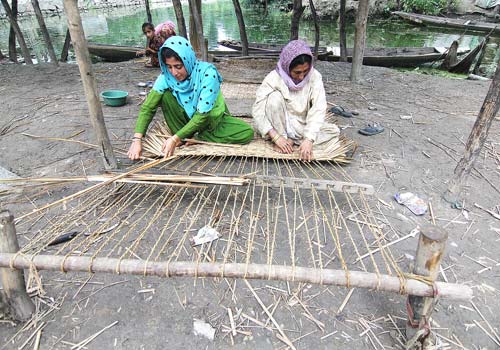Other than growing vegetables, people of Mir-Bahri make traditional Kashmiri mats (wagev) for the living. Those involved in the craft however live in miserable conditions since most of them don’t own land. After laborious effort, a single mat fetches them a paltry sum of Rs 150. Many have left the craft due to less returns because of which the mats are fast replaced by mats made of foam. “Around 12 years ago, people used to prefer these mats. But once foam mats appeared in markets, our business declined drastically,” Zamir Ashai, a feeble man in his forties, who is still involved in the craft, says.
Before the inception of LAWDA, people living within Dal Lake were taking care of ecology of water body. They were considered ‘sweepers of lake’ and were doing regular cleaning bouts of lake till they were asked to stop it. “LAWDA snatched our boats and destroyed them near Nishat two years back when we were busy in carrying the centuries-old practice. They told us that we are filling the lake with mud, which is a blatant lie,” said Amir Asgar, whose boat was also burnt down, said, ”you see the fact of the matter is that lake was better-off before LAWDA. This body has only become a money minting machine without making any difference to the lake.”

However, the LAWDA officials said the people living in Mir Bahri are responsible for the deterioration of the lake. “People living in Mir-Bahri are producers of pollutants to the lake. But now we are disposing the solid waste produced by this community,” says vice-chairman LAWDA, Irfan Yaseen.
People living in Mir Bahri also decry the recruitment of non-skilled manpower for cleaning the lake. “Who else can better take care of the lake other than us? We have been doing it for over 600 years,” Mushtaq Hussain, a local, said. He says many locals were rendered jobless due to the recruitment of non-locals in cleaning of lake. “If given a chance, we can clean many filthy parts of lake within a week. What any engineer from LAWDA can’t do, we can do that. But we are being barred from doing it,” Mushtaq says.
Historical records suggest that the rot in Dal Lake compelled Zainul Abideen, who ruled Kashmir in 15th century, to called ‘lake sweepers’ from Pakistan to Kashmir. They were known as Mir Bahri (Mir means administrator and Bahri means water). They were given water resources like fishes and other lake resources as a source of livelihood for keeping Dal Lake clean. Over a period of time, these people became permanent inhabitants of the land. They kept their cleanliness drive on unless official communiqu? asked them to discontinue.
Recently, the dredging of Dal Lake was carried out with the help of machines, which locals termed as a cosmetic treatment for the ailing lake. The officials took out muck and weeds out of the lake. Soon afterwards, there was proliferation of aquatic ferns. “Machines worth crores of rupees can’t clean the lake. Rather they trouble the ecology of lake. A mass of dead fishes appeared on the banks of Nigeen Lake which had died due to leakage of oil from these machines. These mechanical devices are here to compound the problem, rather than address it,” Showkat Hussan, a local says.
Authorities believe that solid waste coming from the households of Mir Bahri goes into the lake but the locals deny these allegations. “Why on earth will we pollute the lake when our survival depends upon it,” a group of people told Kashmir Life. They said solid waste coming from their houses is being used as manure in their farmlands along with the ferns of the lake.
“Drainages from Khwaja Yaarbal, Naidyaar, Zooni Lanker and Nawpora which end in the lake and fill it with sewage from the city is the main source of pollution to lake,” they said. Tourist rush, hotel outlets and houseboat wastes are the other major factors which, locals allege, contribute to the pollution of the lake.
In this beautiful natural theatre, land mafia is playing its role as well. According to locals, land brokers and land revenue officials are grabbing people’s land covertly. “These frauds are hand-in-glove with authorities who are snatching land from us without our approval and knowledge,” said an octogenarian, Aga Shahi.
Showket Langoo, 35, is a carpenter by profession. These days, he seldom goes to work for the fear of losing land to brokers. He owns five kanal land out of which he already lost half kanal to broker ploy. “Since they have official backing, nobody musters the courage to resist their plans,” said Showket in a frail voice.
There are many concerns and fears among the people. Only if someone could the marginalized people a patient hearing.















